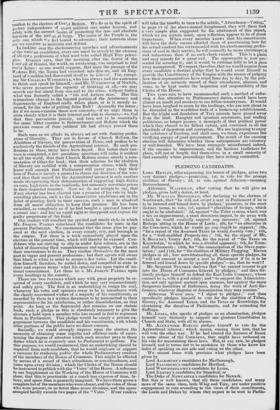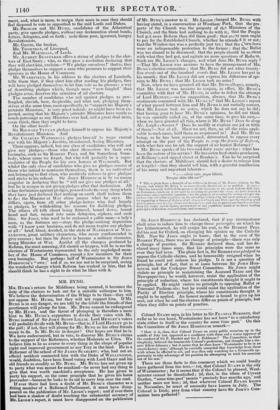PLEDGING CANDIDATES.
LORD HENLEY, after expressing his horror of pledges, gives two very distinct pledges,—promising, 1st, to vote for the prompt abolition of Slavery ; 2d, to vote against Atheism—meaning Retrenchment.
Alderman WAITHMAN, after vowing that he will give no pledges, gives half a dozen, at least.
Mr. WILLIAM BROITGHAM, after declaring to the electors of Southwark, that "he will not accept a seat in Parliament if he is to be fettered and bound down by pledges," promises, in the most distinct terms, to vote, 1st, against " pluralities of livings, which ought to be abolished ;" 2.d, against " the Tithe system, which was a tax on improvement, a most obnoxious impost, to do away with which he would cordially support any measure;" 3d, against Bishops sitting in the House of Lords ; 4th, for "an alteration in the Corn-laws, which he would go any length to support;' 5th, "for a repeal of the Assessed Taxes he would frankly vote ;" 6th, for a " well-modified Property-tax ;" 7th, for the repeal of Mr. S. BOURNE 'S Vestry Act; 8th, for the repeal of "the Taxes on. Knowledge," to which lie was a decided opponent; 9th, for Trien- nial Parliaments ; 10th, for " the emancipation of the Slave popu- lation ;" and 11th, for "the abolition of Military Flogging." Eleven pledges in all ; but notwithstanding all these specific pledges, he " will not consent to accept a seat in Parliament if he is to be fettered and bound down by specific pledges"—no, that he won't ! Mr. Sergeant SPANKIE declares that "he cannot consent to go into the House of Commons fettered by pledges ;" and then dis- tinctly pledges himself to defend the East India Company, whose counsel he is, with a good salary; and " to support the Administra- tion, not only against ancient open enemies, but against the more dangerous hostilities of Reformers, doing the work of Anti-Re- formers, whatever disguise or denomination they may assume." Alderman WOOD says, " I object to pledges ;" and then specifically pledges himself to vote for the abolition of Tithes, Slavery, the Assessed Taxes, and the Taxes on Knowledge, for shortening the duration of Parliaments, and for extending the Suffrage.
Mr. LYALL, who speaks of pledges as an abomination, pledges himself very distinctly to support our glorious Constitution in Church and State, with all its abuses.
Mr. ALEXANDER BARING pledges himself to vote for the Agricultural interest ; which means, coming from him, that he will vote the other way. If he had treated the farmers of Essex to some abuse of the Corn-laws, they might have reckoned on his vote for maintaining those laws. But, at any rate, he pledges himself, and in terms not to be mistaken by those who know his habit of speaking on one side and voting on the other. We cannot learn with precision what pledges have been given by Lord AMESBURY'S candidates for Marlborough, Lord SALISBURY'S candidates for Hertford, Lord WESTMORELAND'S candidate for Lyme, Lord EXETER'S candidates for Stamford, or The Duke of NEWCASTLE'S candidates for Newark.
But this is well known, that allj these candidates, and many more of the same class, both Whig and Tory, are under positive engagement to vote according to the views of their constituents, the Lords and Dukes by whom they expect to be sent to Parlia- - anent, and, what is more, to resign their seats in case.they. should feel disposed to vote in oppositioh to the said Lords and Dukes. • Mr. BRISCOE and Mr. HUME, candidates of the Atheistical party; give specific pledges, without any declamation about bonds; fetters, delegates, and so forth ; as do those poor, ignorant, hungry Revolutionists, Mr. GROTE, the banker, Mr. THORNELY, of Liverpool, And Mr. MARSHALL, of Leeds.
Mr. AUBREY BEAUCLERK offers a string of pledges to the elec- tors of East.Surry ; who, as they pass a resolution declaring that they will elect him, exclaim—" We pledge ourselves !" that is, they pledge themselves to support a man who promises to support their opinions in the House of Commons.
Mr. 'WAKEFIELD, in his address to the electors of Lambeth, tells them that, if they elect him after reading his pledges, they will have pledged themselves to let him vote as he pleases ; a way of describing pledges which, though more " newfangled" than pledgts even; deserves the attention of all electors. The number of candidates who rail against pledges as new- fangled, slavish, base, despicable, and what not, pledging them- selves at the same time, most specifically, to "support his Majesty's patriotic Ministers," is very great indeed ; as might have been ex- pected, seeing that his Majesty's patriotic Ministers have nearly as much patronage as any Ministers ever had, and a great deal more, some thinkethan they ought to have.
On the other hand-- Sir •BICHARD VYVYAN pledges himself to oppose his Majesty's Revolutionary Ministers. And Sir 'CHARLES WETHERELL pledges himself to wage eternal war with his Majesty's Jacobin, tri-coloured, Swing Ministers.
There appears, indeed, but one class of candidates who will not give ..any pledges,—those who elect themselves for their own boroughs, such as Sir ROBERT PEEL and Sir Something Some- body, whose name we forget, but who will probably be a repre- sentative of the People for his own houses at Weymouth. But whilst the only class of candidates who give no pledges consist of those who intend to nominate themselves; there is an hull vidual notibelonging.to that class, who positively refuses to give pledges and sticks to his refusal. Sir JOHN HOBHOUSE is by no means singular in declaring that he " will not give any pledges at all ;" but is unique in not giving pledges after that declaration. All other declaimers against pledges, proceed to do the very thing which they have just declared that nothing on earth shall induce them to do : the Minister at War alone means what he says. He hitters, again, from all other pledge-haters who deal largely in pledges, by withholding his reasons for disliking pledges. The others all talk about being fettered, bound down, bound hand and foot, turned into mere delegates, ciphers, and such like. . Sir JOHN, who used to be reckoned a polite man—a lady's man, as 'the footmen say—stops the pledge-seeking deputation with "I know your business, and do not mean to give any pledges at all :" brief, blunt, decided, in the style of NAPOLEON or WEL- LINGTON, great military characters, who never condescended to give reasons ; but then Sir JOHN is become a military character, being Minister at • War. Amidst all the changes produced by Reform, the most amusing, if it should so happen, will be to see the electors of Westminster represented by the only unpledged mem- ber. of the House of Commons, except a few members for their own boroughs. But perhaps half of Westminster is Sir Joins HOBHOUSE'S " own ;" and it' so, we are not to be surprised, seeing the wonderful change which Reform has worked in him, that he should think he has a right to do what lie likes with it.




























 Previous page
Previous page